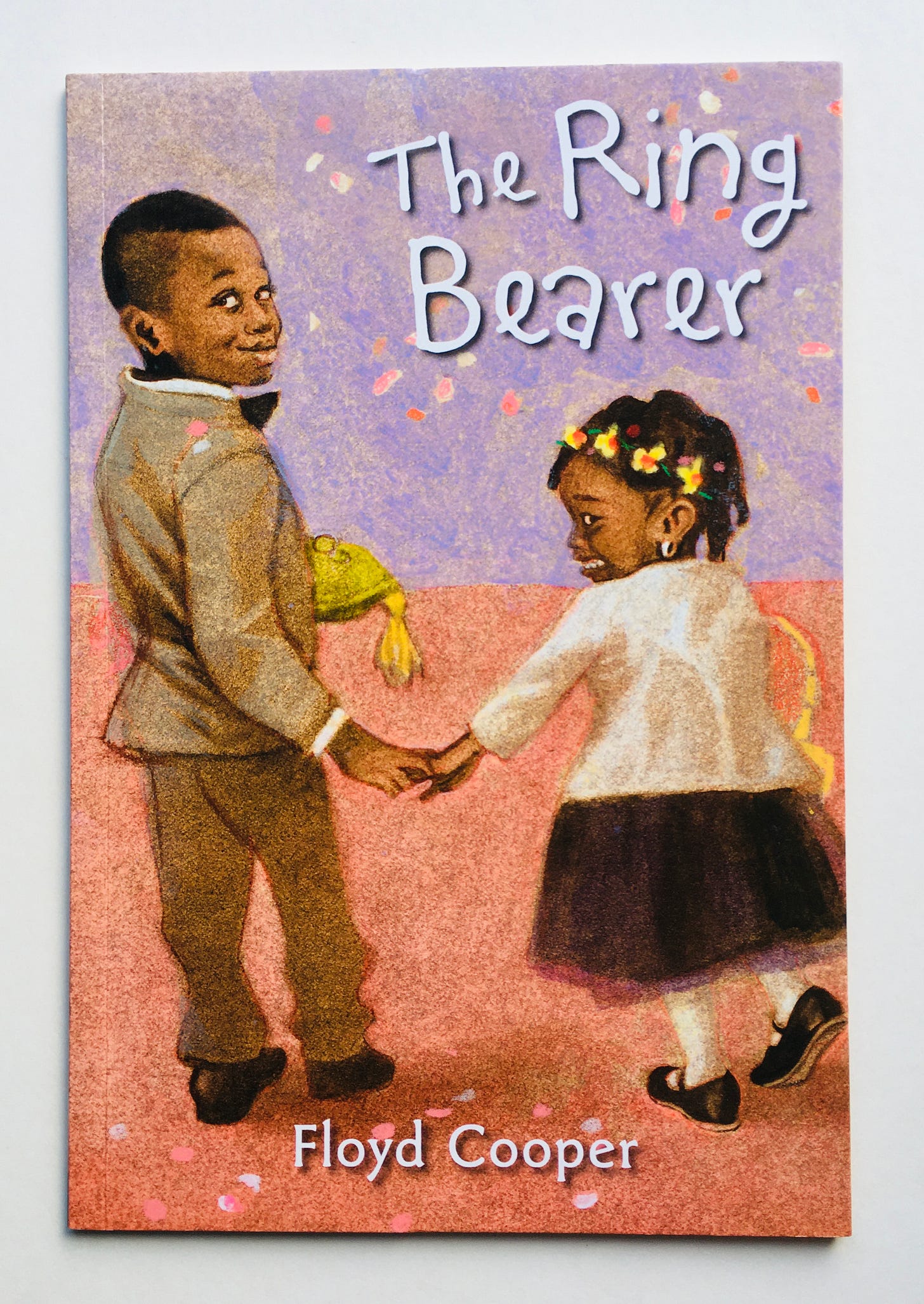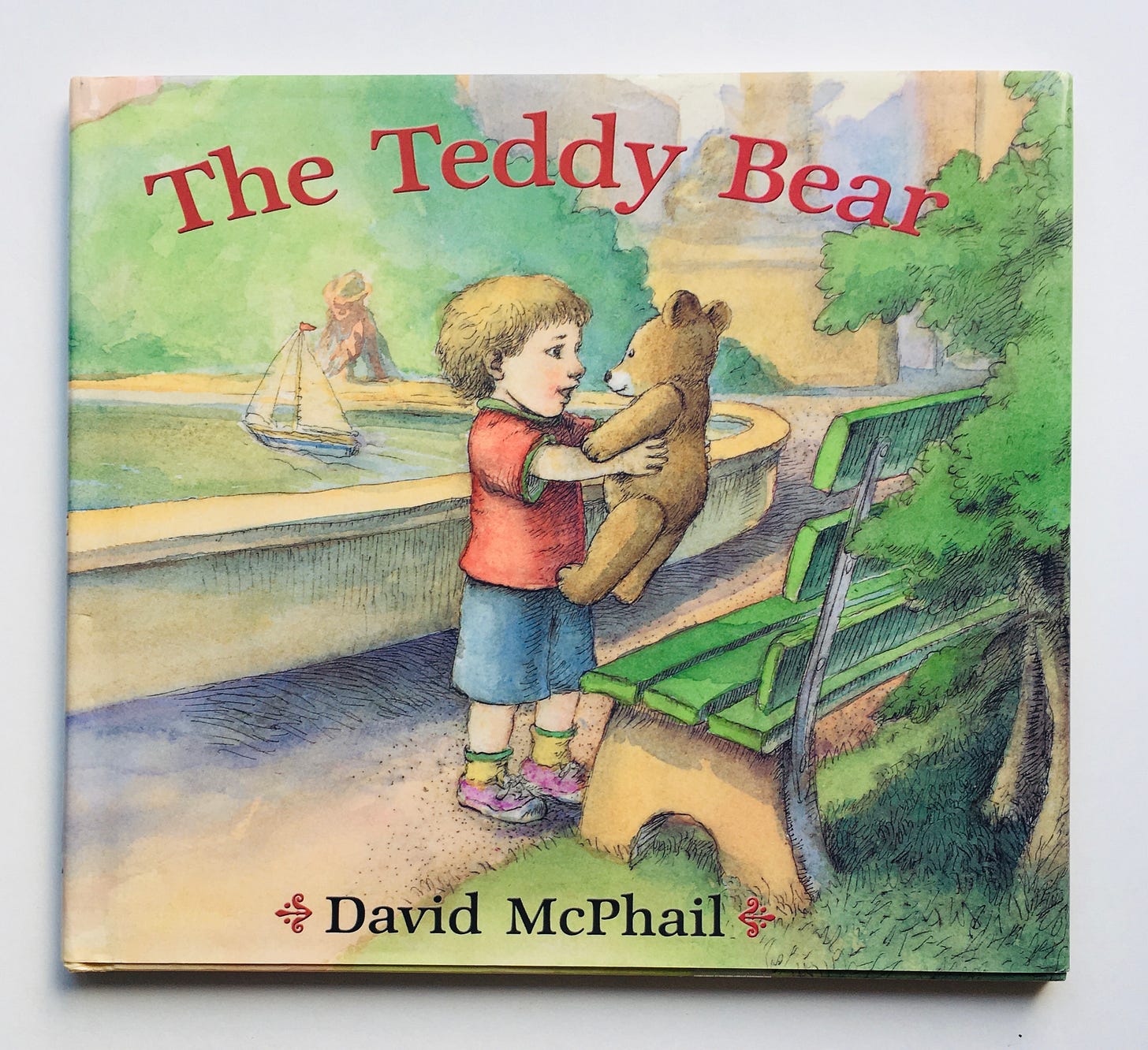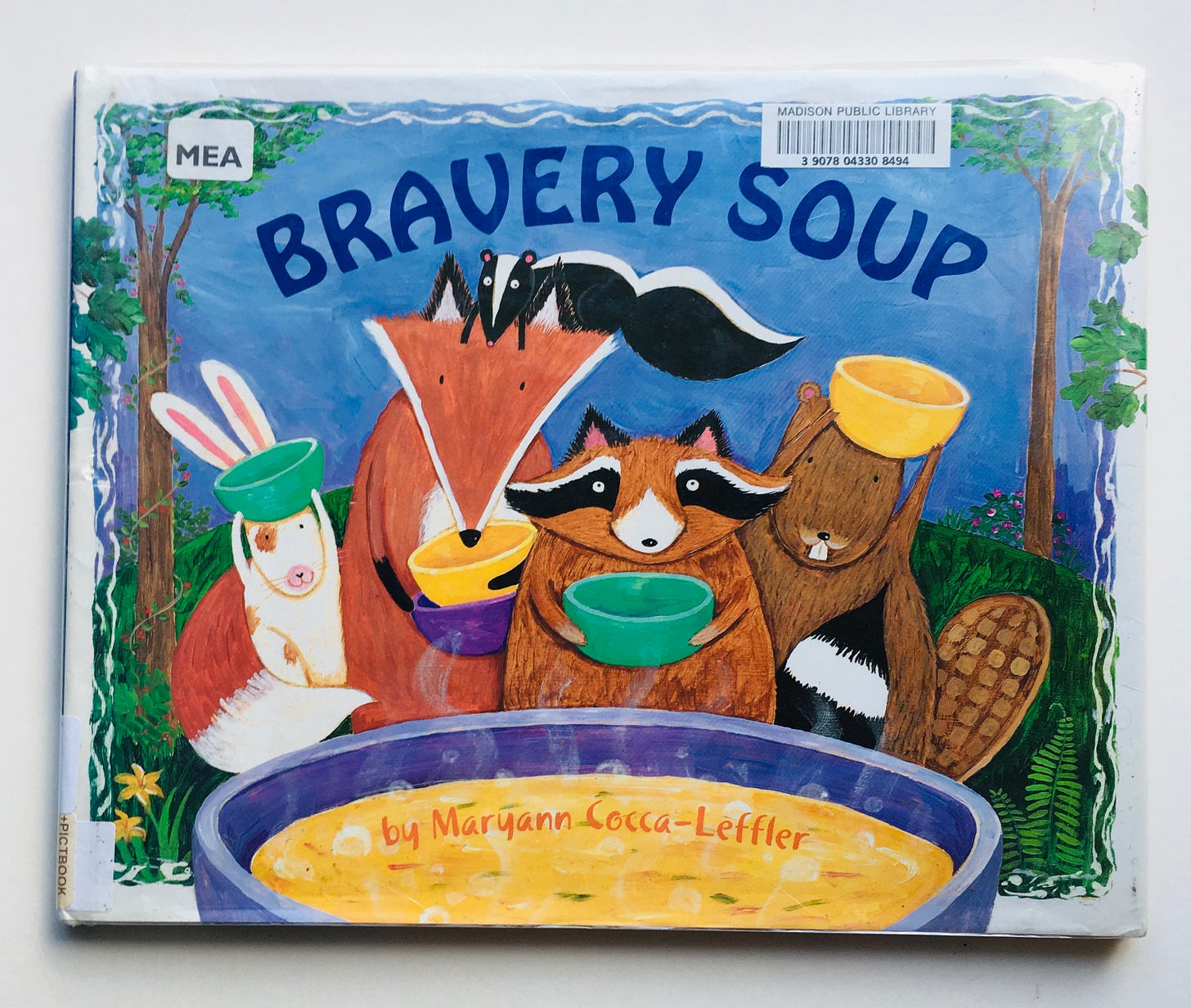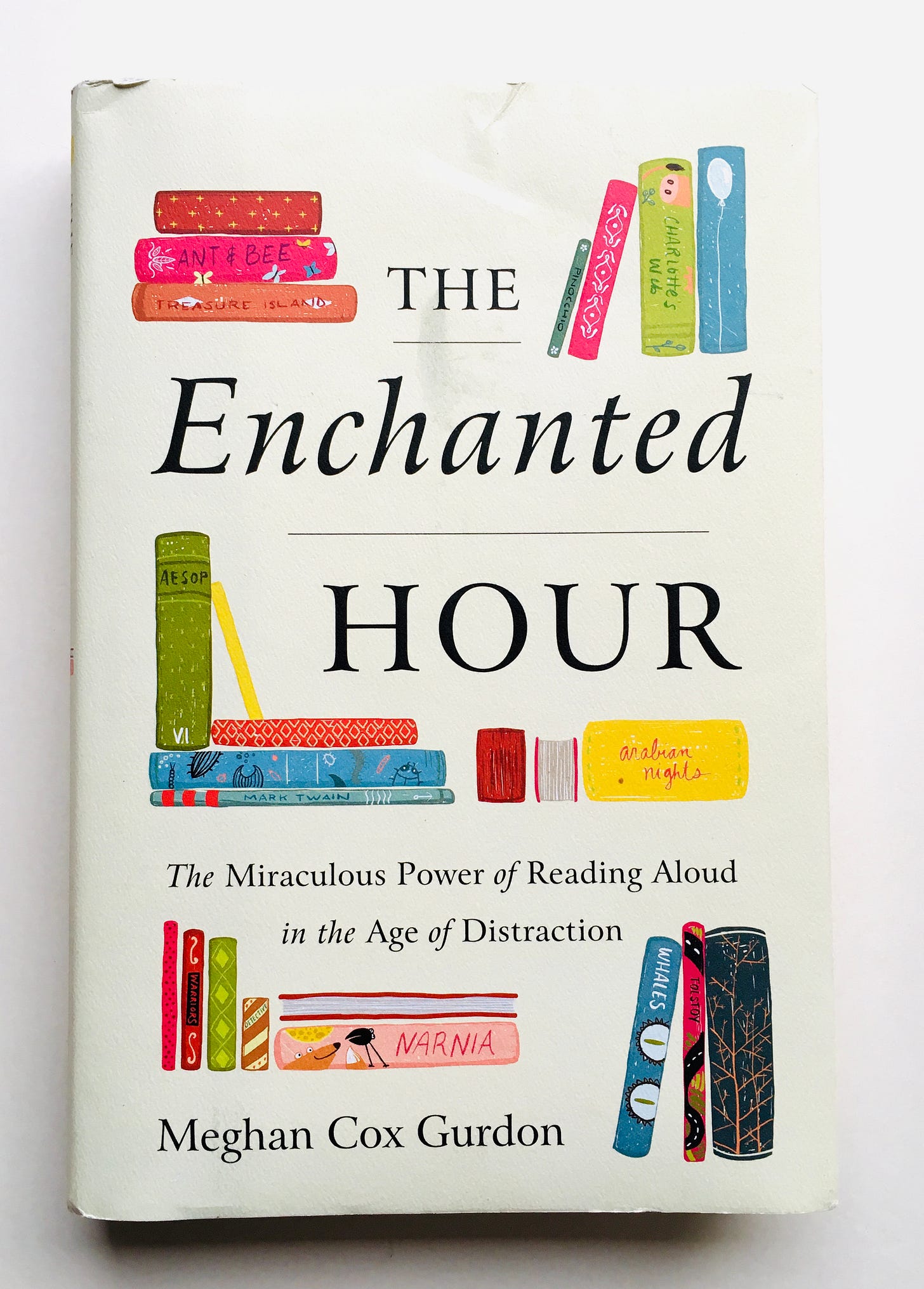Weddings 💍 Teddy bears 🧸 Soup 🥣 Reading 📚
Can we read? No. 53
From a house practically exploding with children’s books straight to your inbox, you’ll get weekly reviews and inspiration designed to help you create a culture of reading in your home.
As a lifelong bookworm, avid reader, writer, and mother, I created this newsletter to help children’s books find the right readers — to share with you an abundance of titles, old and new, and support you in raising readers of your own.
Think of me as your personal coach and personal shopper, guiding you to feel more confident in choosing books for your family, and taking the time and effort out of it all, so you can spend those precious resources on the most important part: reading together.
The great thing about subscribing for just $1.25 a week is that you won’t have to look any further than your inbox to find excellent and truly delightful titles for your kiddos, whether they are still trying to eat every board book in sight or tearing through chapter books faster than you can supply them — you’ll never miss an update or the chance to bring fresh titles and new ideas into your home.
(You don’t have to be a parent to find value in this newsletter! Many subscribers are grandparents, aunties/uncles, teachers, librarians, therapists — you name it. If there are children in your life in any capacity and your relationship might be strengthened by books and reading, this resource is for you.)
The Ring Bearer by Floyd Cooper (2017)
Tomorrow I am headed down a heavily-traveled interstate through two major cities to the very edge of the Mason-Dixon line (an eight-hour drive) with our two children for a family wedding. As if traveling isn’t hard enough there is traveling — not to mention a full-blown wedding — in the age of Covid and of course, Delta, with kids too young to be vaccinated. I could say a lot more but I won’t. Let’s just go with: I am taking that potent brew and making a very purposeful effort to try to turn it into lemonade. Hence, here is a review of a wedding book.
And what a sweet wedding book it is. You can never, ever go wrong with Floyd Cooper, who died this past August (the New York Times had a lovely obituary, which discussed the motivation behind his work). He left behind a body of titles that are unmatchable.
Here the reader meets Jackson, a little boy whose mother is getting married, full of all the worries one might expect in that situation: what will it be like to call his mother’s boyfriend “Dad?” Will he get along with his new little sister, Sophie? And will he be able to handle his important job, as ring bearer in the wedding?
Cooper’s distinctive, dreamy mixed media illustrations are always evocative but very much so here, when Sophie — in the midst of an important job of her own, as flower girl — falters on her way down the aisle and Jackson rushes to help her. The joy expressed both in the coming together as a new family and in the fulfillment of a big responsibility is palpable and endearing.
This is a lovely book full of belonging to one another, celebration, and all kinds of love.
The Teddy Bear by David McPhail (2002)
If you’ve been here for awhile you know that I am a fervent David McPhail fan — I’m just going to keep reviewing and reviewing and reviewing his books, not least because it gives me an excuse to keep buying them, but also because he’s that good.
This title is one of his heavier ones, as it is the story of a little boy who one day, “in a moment of confusion and forgetfulness” loses his beloved teddy bear at a diner. The bear ends up in the trash but is swiftly rescued by “a bearded man wearing a long green coat” who ambles through city streets and, at night, curls up in a dumpster. The boy misses his bear and the bear misses his boy but they each find their own ways to be happy apart. One spring day the man leaves the bear on a bench and the boy just happens to pass by at that exact moment, spotting the bear and scooping him up in total amazement. He walks away but not before he hears the wail of the man, now returned, looking for his bear. The boy doubles back to the bench, hands the bear to the man, and the two have an exchange:
“Thank you,” he said to the little boy. “I don’t know what I’d do without him.”
”I know what you mean,” said the little boy. “I used to have one just like him.”
McPhail’s handles the subject of homelessness with great sensitivity and insight here, both through his prose and his watercolor illustrations — with special emphasis on the emotions of everyone involved (including, wonderfully, the bear’s, which goes to show how deeply he understands his young audience).
This is a beautiful book brimming with messages about loneliness, generosity, and selflessness in a way that is neither didactic nor sentimental, but just right.
Bravery Soup by Maryann Cocca-Leffler (2002)
Carlin is afraid of absolutely everything. His friend suggests that he needs a little bravery, so together they set off to find Big Bear, “the bravest animal in all the land,” who just happens to be stirring a big pot of soup that’s missing a secret ingredient. Big Bear gives Carlin an assignment, should he choose to accept it — Carlin must go alone on a difficult journey to find a box in a cave at the top of Skulk Mountain.
Carlin nearly loses it — he shouts and shakes in his fear — but his other forest friends equip him with helpful items for the trip and Big Bear reassures him, “You are braver than you think,” so he sets out. The quest is not easy but Carlin makes it, confronts the monster living in the cave, and returns to Big Bear with the requested box, only to discover that it’s empty.
Empty?! Carlin despairs that he didn’t find the secret ingredient for bravery but Big Bear explains the box was always empty — “It’s not what is inside the BOX that makes bravery,” he says, “it’s what’s inside of YOU!”
In this title Cocca-Leffler has written a story that comes pretty dang close to being a Zen parable (“The box was always empty”) but it really works. And her acrylic illustrations are wonderfully expressive, perfectly conveying the thoughts and feelings of all the characters, a feature that might draw in littles who may yet be too young to relate fully to the storyline (though I would argue struggling to be brave applies to all ages, though we may not recognize it as such) — plus they are cute as all get out.
This is an excellent title for anyone who needs a little boost of courage, especially if facing one’s fears is an ongoing issue or you have a child who could benefit from the reassurance that everything they need is already inside of them. (Then again, isn’t that all of us?)
For more soup books, check out yesterday’s mini issue on soup in Notes From the Reading Nook:
The Enchanted Hour: The Miraculous Power of Reading Aloud in the Age of Distraction by Meghan Cox Gurdon (2019)
“Family life can be a hectic and flailing business. Sometimes it’s a struggle to keep everyone afloat, let alone to haul them onto a read-aloud raft at bedtime. Yet it’s an effort worth making, especially now that almost everyone’s raft is tossing on a wide and often lonely sea of pixels. Young and old, we need what reading aloud has to offer.” (page xix)
Long-time children’s book critic for the Wall Street Journal and, more relevantly, mother of five, Cox Gurdon read to her kids for an hour every single night, from birth for as long as they would let her. In sharing the how and why she did so, she has written a mixture of memoir and advocacy that has inspired me like none of the other “books about the importance of reading aloud” have. Already a convert to that particular camp, obviously, it’s her easy writing style peppered copious amounts of research, science, argument, and anecdote that impressed me mightily when I first read it a few years ago, and which has held up over multiple re-readings since then.
If you’re looking for an examination of brain and/or social science when it comes to the importance of reading, Cox Gurdon will not disappoint. Yet she does so in an entirely accessible way:
“…listening to stories while looking at pictures stimulates children’s deep brain networks, fostering their optimal cognitive development. Further, the companionable experience of sharing reading cultivates empathy, dramatically accelerates young children’s language acquisition, and vaults them ahead of their peers when they get to school. The rewards of early reading are astonishingly meaningful: toddlers who have lots of stories read to them turn into children who are more likely to enjoy strong relationships, sharper focus, and greater emotional resilience and self-mastery. The evidence has become so overwhelming that social scientists now consider read-aloud time one of the most important indicators of a child’s prospects in life.” (page xiv)
This is the book I reach for when I need to remember why I spend so much time and energy reading to my kids — when things are going along swimmingly it’s a pat on the back and when we’re not reading as much as I’d like it’s a welcome kick in the pants. It’s both a useful manual and motivating manifesto — she explains in-depth what she did with her own kids over nearly two decades (including sharing so many beloved and recommended titles there is a list in the back that captures them all) and makes you want to figure out how the hell to find an entire hour inside every evening to read to your own kids (if you manage it, let me know, will you? I have not yet discovered how to bend time myself).
This excellent title is a testament to a simple yet unbelievably powerful idea (as she writes on page 89): “Surround young children with lots of lovely words, it seems, and all manner of good things happen.”
Highly recommended.
(If you are interested in more titles like this one, check out my list on Bookshop.org, “Resource books for raising readers” — I have read them all and found them useful time and again. If you make a purchase from that list — or any of my others — I receive a small commission, at no extra cost to you.)
Thanks for being here today. And remember, if you are managing to read with the children in your life (or, barring that, if you are sending books their way), you’re doing a great job. It doesn’t have to be anywhere near an hour a day; it doesn’t have to be perfect. Keep up the good work.
Sarah






